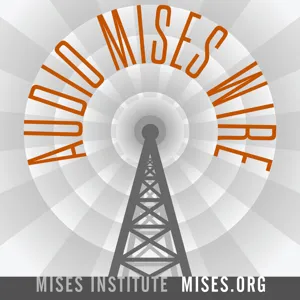Podcast Summary
Málley's Austrian economics transformation: Javier Málley's encounter with Austrian economics led him to question his Marxist-Keynesian beliefs, transforming his understanding of economic growth, entrepreneurship, competition, market failures, distribution, and the negative effects of state intervention.
That Javier Málley's conceptual clarity and shift towards Austrian economics have been instrumental in his rise to political power in Argentina. Málley, an economist, was previously educated in the Marxist-Keynesian and neo-Keynesian paradigms, but his encounter with Murray Rothbard's "Monopoly and Competition" in 2013 led him to question his understanding of structural market theory. He underwent a transformative experience after reading numerous Austrian economic texts, gaining insights into economic growth, the role of the entrepreneur, market competition, market failures, distribution, and the detrimental effects of state intervention. This newfound knowledge led him to abandon the concepts of equilibrium, externalities, and information asymmetry. Málley's clear vision and commitment to Austrian economics have set him apart from the political landscape in Argentina, positioning him to potentially transform the country into a prosperous one through classical liberal policies.
Argentinian Capitalism Shift: Argentinian politician Javier Milias's promotion of Austrian economic theories could lead to a significant shift towards capitalism and free market principles in Argentina, potentially helping the country overcome economic and political crises through unconventional measures like reducing budget deficits and adopting free currency circulation systems.
Argentinian politician Javier Milias's influence and promotion of Austrian economic theories could potentially lead to a significant shift towards capitalism and free market principles in Argentina. Mises' argument that only capitalism and socialism are viable economic systems, and the growing interest in Mises, Rothbard, and Hayek's works, suggest that a large portion of the Argentinian population could embrace these ideas. Milias's unconventional political initiatives, such as reducing the fiscal budget deficit, closing the central bank, and adopting a free currency circulation system, could help Argentina overcome its economic and political crises. These measures could also stem hyperinflation and provide Argentinians with the freedom to choose their preferred means of exchange. Overall, Milias's impact on Argentinean society could mark a turning point in the country's political future.
Maliska's unconventional political strategies: Maliska, with limited financial resources, rose to power in Argentina through unconventional political strategies including economic education, public appearances, and media interviews, contrasting with the status quo arguments of opponents.
Fernández, also known as "Maliska," used his deep understanding of economics and unconventional political strategies to defy expectations and rise to power in Argentina. His passionate and combative style, rooted in his economic knowledge and patriotic zeal, set him apart from past conservative and right-wing politicians. Malay's means of achieving political success were remarkable, especially considering his limited financial resources. He employed recitals, public appearances, and media interviews to spread his message and attract supporters. His unique approach, which focused on economic education and actionable plans, contrasted with the status quo arguments of his opponents. This intellectual strength, combined with his entrepreneurial spirit, allowed Malay to capitalize on political opportunities and ultimately reach the pinnacle of power in Argentina.
Power of ideas and conviction in politics: Argentinian politician Javier Milei gained popularity through his unconventional approach to politics, relying on ideas and conviction instead of billions for publicity, resonating with Argentinians during a crisis, and potentially challenging the political structure with plans to eliminate the central bank and reduce the size of the state.
Argentinian politician Javier Milei is making waves in his country's politics with an unconventional approach. Unlike his main rivals who spent billions on publicity and direct payments, Milei relied on the power of his ideas and conviction. He entered politics in 2021, advocating for liberty, capitalism, and citizen protection from the state. His clear message resonated with Argentinians, especially the younger generation, during a time of crisis. Milei's plans to eliminate the central bank and reduce the size of the Argentinian state have the potential to challenge the modern political structure if successful. All of this was achieved without the typical forms of campaign publicity, demonstrating that the power of ideas and conviction can be a formidable force in politics. This could mark a significant shift in Argentinian politics and potentially inspire similar movements in other countries.

